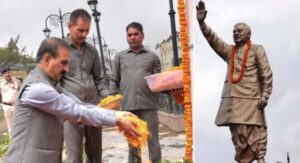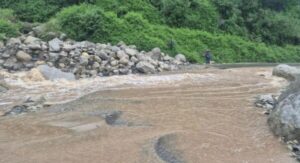Delhi Water Crisis: For Water Supply, Delhi Govt to Pay Himachal Pradesh, Controversy Continues

Delhi Water Crisis: For Water Supply, Delhi Govt to Pay Himachal Pradesh, Controversy Continues
Shimla, 21 February —The Delhi government has decided to pay the Himachal Pradesh government to supply water to the national capital as the water crisis escalates in the national capital. The step comes as concern has been rising about the distribution of the water, as the Supreme Court has voiced its frustration at delays and miscommunication between the two states.
The issue, which has come on the national radar, concerns the release of water to Haryana by Himachal Pradesh, which in turn passes it to Delhi through the Hathnikund Barrage. With this water deficit increasing, the problem has now reached levels that have raised eyebrows when it comes to long-term water security in the national capital, affecting the lives of millions of residents.
The Supreme Court is Clearly Upset That You Are Not Taking Its Orders Seriously
The most recent updates in the continuing legal war were highlighted by a Supreme Court hearing on the waste of water and the inability to provide the promised supply. The Supreme Court showed grave dissatisfaction over the replies filed by both the Delhi and Himachal Pradesh governments during the course of proceedings.
The Himachal Pradesh government had given an assurance to the court during the earlier hearings that it had surplus water in October, 2023 and it was willing to supply the same to Haryana. Water would flow from Haryana to Delhi through the Hathnikund Barrage, which has long been a strategic source of water for the capital. The court had directed Himachal Pradesh to clean the 137 cusecs as Haryana’s additional quota of water on the basis of this assurance.
But the Himachal Pradesh government has not fulfilled this commitment, the court was told. The supplementary water has not been delivered, despite promises to the opposite, much to the displeasure of the members of the court. The Supreme Court also wondered if the Himachal Pradesh officials ought to be held in contempt of court for going back on the government’s word.
Delhi: Water Supply Remains Short of Requirement
Demand for water in Delhi outweighs the present supply by a wide margin and the water crisis in the national capital is getting worse. As per the water-sharing agreements between the states, Delhi is entitled to get 1,013 cusecs of water, a counsel appearing for the Delhi government ue, Delhi is getting only between 800 and 900 cusecs of water, substantially below the demand.
This diminished supply has created intense pressure on the city’s water distribution systems and residents in several neighborhoods are dealing with intermittent shortages of water. Moreover, besides the Haryana supply being moved out, wastage in the distribution of water from remaining resources has continued to haunt the city.
The continuing shortage is particularly difficult for residents of water-scarce areas of Delhi, where daily water cuts are the norm. The problem is an acute one, as millions of people rely on a small amount of water, and it has become a point of contention for the Delhi government, which has historically been calling for a consistent and reliable supply of water for its ever-increasing population.
Delhi Govt. water Supply provided on behalf of Central Govt.
With the state facing an ever-widening water issue and other legal challenges, the Delhi government is now seeking to pay Himachal Pradesh for a constant supply of water. Under this agreement, Delhi will make payments to Himachal Pradesh for more water, which is meant to facilitate a continuous crossing of water into the capital.
The Delhi government claimed it will compensate Himachal Pradesh for the extra supply which will be diverted via Haryana. It is a pragmatic step to go around the lengthy negotiations and red tape that have bogged down earlier deals. The Delhi government aims to simplify this by providing money for a fixed quantity of water every month, providing the residents not only with cash but a fixed, assured quantity of water, which is now being offered free of cost.
Although the financial package may address Delhi’s short-term needs, the long-term viability of such a solution is questionable. The water-sharing agreements between the states are “not in good shape” and there is “very little” overall management of water resources, many experts have said. On the other side, the Himachal Pradesh government is bound to its commitments to ensure a round-the-clock supply of water.
Supreme Court To Hear More On Thursday
While the fight over the water supply plays out in court, the Supreme Court is set to have another hearing on the case on Thursday. The court is likely to hear more on the non-compliance part by Himachal Pradesh and the impact of this on water supply to Delhi.
The delays, and failure to meet mutually agreed upon quotas for water allocation, have caused an escalation in tensions between the involved states. The court is perhaps going to pass orders on further steps to ensure compliance by the Himachal Pradesh government on its commitments, more so since this order concerns the water crisis which affects residents of Delhi.
The water crisis of Delhi: Is there any solution?
It highlights the mounting challenges faced by urban centres like Delhi in supplying enough water resources to meet the populations’ demands. As the city’s population grows, the water scarcity challenge is likely to become even more acute in coming years.
Because managing the water supply in the region is already complicated and sparking conflict, experts say a new approach is required, at least a moderate short- to long-term planning, numerous facilities treating and transferring water and states working together rather than alone. The existing water-sharing treaties, which have frequently led to disputes or holdups, may have to be adjusted so that urban centers like Delhi can rely on a consistent, reliable flow of water in future.
But for now, it is immediate action to address the present crisis and ensure that Delhi gets the water it deserves per the agreements in place. The Supreme Court’s ordering of the case highlights the gravity of the situation, and the upcoming hearings may be pivotal in deciding how the water situation will pan out for both Delhi and Himachal Pradesh.

Continuing the achievement of the journey of effectiveness and credibility of more than 10 years in the career of journalism, as a woman journalist, I am Serving as the founder, promoter and editor of DiaryTimes with the trust and support of all. My credible coverage may not have given a big shape to the numbers, but my journey presents articles that make you aware of the exact and meaningful situations of Himachal’s politics, ground issues related to the public, business, tourism and the difficult geographical conditions of the state and financial awareness. DiaryTimes, full of the experience of my precise editorial expertise, is awakening the flame of credible journalism among all of you, so that the eternal flame of meaningful change can be lit in the life of the people of the state and the atrocities being committed against the people can be brought to the fore, I am motivated for that. If even a small change comes with the power of my journalism and the whole world becomes a witness to that issues, then I will consider myself fortunate.





